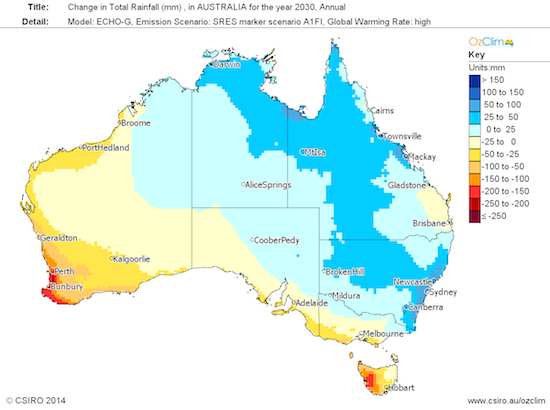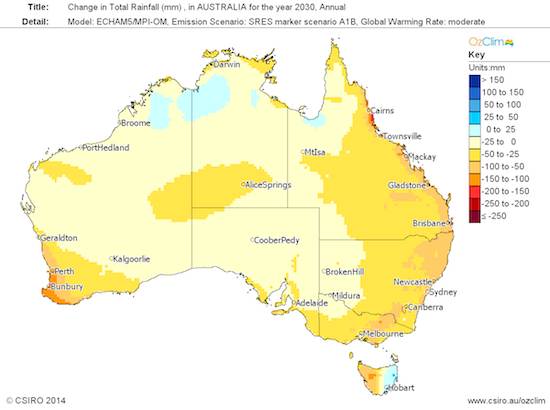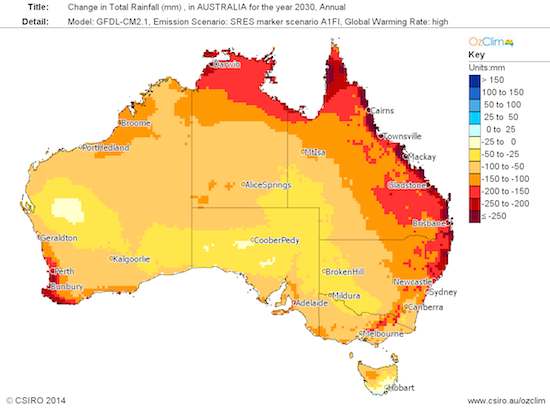By Sierra Rayne ——Bio and Archives--May 17, 2014
Global Warming-Energy-Environment | CFP Comments | Reader Friendly | Subscribe | Email Us
"Any way you want it. That's the way you need it."At CSIRO, which is Australia's national science agency, they provide an OzClim website that allows the public to explore "climate change scenarios for Australia." The following three rainfall scenarios are provided when users are prompted to "choose from a selection of most requested scenarios":


 Any way you want it. That's the way you need it.
Keep in mind that as I discussed in a previous article, the trend in precipitation over almost all of Australia since 1900 has been one of either increasing precipitation, or no trend whatsoever. Since 1970, there have been no significant trends in annual precipitation in any of the country's climate regions.
According to the climate models, what looks to be about two-thirds of the entire continent switches from trending towards drier conditions over the next 16 years to a trend towards wetter conditions when we compare the "drier" and "wetter" climate modeling results. Look at some of the variation. Darwin, on the north-central coast, has an annual precipitation prediction range between a decrease of greater than 250 mm/year and an increase of up to 50 mm/year. The same absurdly large projection range is made for the southeast region in and around Sydney and Canberra.
This brings us to a recent troubling two-part speech given to the Carbon Market Institute Conference in Melbourne by Ian Chubb, the Chief Scientist of Australia, and subsequently published in the Business Spectator. The greatest concern is that we even have "chief scientists." What exactly are they supposed to be? No single individual can either be taken to reliably represent, and certainly not lead, the broad, diverse -- and often conflicting -- realm of science. Science is, and works best as, a collection of independent individuals each speaking their own minds. This concentration of power in science among few individuals has been its greatest threat for many years now, and yet the unfortunate trend continues.
Chubb's speech was apparently entitled "a science lesson for Maurice Newman and Senator Brandis." Chubb's statements are a litany of contradictions. Take this one:
Any way you want it. That's the way you need it.
Keep in mind that as I discussed in a previous article, the trend in precipitation over almost all of Australia since 1900 has been one of either increasing precipitation, or no trend whatsoever. Since 1970, there have been no significant trends in annual precipitation in any of the country's climate regions.
According to the climate models, what looks to be about two-thirds of the entire continent switches from trending towards drier conditions over the next 16 years to a trend towards wetter conditions when we compare the "drier" and "wetter" climate modeling results. Look at some of the variation. Darwin, on the north-central coast, has an annual precipitation prediction range between a decrease of greater than 250 mm/year and an increase of up to 50 mm/year. The same absurdly large projection range is made for the southeast region in and around Sydney and Canberra.
This brings us to a recent troubling two-part speech given to the Carbon Market Institute Conference in Melbourne by Ian Chubb, the Chief Scientist of Australia, and subsequently published in the Business Spectator. The greatest concern is that we even have "chief scientists." What exactly are they supposed to be? No single individual can either be taken to reliably represent, and certainly not lead, the broad, diverse -- and often conflicting -- realm of science. Science is, and works best as, a collection of independent individuals each speaking their own minds. This concentration of power in science among few individuals has been its greatest threat for many years now, and yet the unfortunate trend continues.
Chubb's speech was apparently entitled "a science lesson for Maurice Newman and Senator Brandis." Chubb's statements are a litany of contradictions. Take this one:
"Ask for 'proof', even though such a demand shows little understanding of how science works. For a start, what would be the controlled experiment? It would need our world plus a parallel planet the same as ours with all the variables except human beings?"Huh? Asking for proof "shows little understanding of how science works." Quite the contrary. It is exactly how science works. Science without proof is pure quackery. For a chief scientist of a major industrialized nation to state that asking for proof illustrates a very poor understanding of how science works demonstrates clearly how truly off-course most of the scientific establishment now is. Over my decade of post-secondary schooling in science, I was told nothing else by a wide range of teachers in a variety of subjects that without "proof" we only had hand-waving nonsense. And now Chubb is claiming the very opposite. Absolutely terrible message for the young folks coming up through the scientific ranks. Furthermore, we would need more than a single control planet and a single treatment planet for "proof" via the approach Chubb advocates. His method wouldn't yield any statistical significance (i.e., confidence in the results), as the responses of the single control and single treatment planets could give unusual results based on the inherent climatic variability within each class. For "proof" we would need multiple replicate control and treatment planets whose results provided a high level of statistical significance that the null hypothesis could be rejected with near certainty. At the very least, what would be a step in the right "proof" direction would include the following: (1) climate models that collectively and uniformly produce high-precision/high-accuracy predictions that can be tested; and (2) a far more accurate interpretation of current and historical trends than we are seeing in reports such as the National Climate Assessment. At present, neither basic criteria is met. Just look at the modeling results for precipitation in Australia. They range from strongly drying trends to strongly wetting trends in the same geographic area over the next decade-and-a-half. How can the climate modelers lose? The actual precipitation trend in these regions will almost certainly have to lie between the two extremes, allowing the modelers to claim they got it right and accurately predicted the future. Hogwash. That is like me saying we will either receive precipitation tomorrow, or we won't. I can't be proven wrong. Now if I develop a model that predicts 10 mm of precipitation tomorrow, and 9 mm is received, perhaps my model has merit. But if no precipitation occurs, or only 2 mm takes place, or a deluge of 30 mm is what happens, then my model must reasonably be called into serious question. A model's precision and accuracy over time -- particularly in difficult situations -- are the true tests of its utility. I have not seen that utility from current climate models. Chubb apparently disagrees with this more rigorous standard for modeling, and so he claims that "modelling is critical. It points out directions like road signs on the freeway -- they tell us the direction we are heading, and the distance, but they don't presume to be accurate to the centimetre. It would be as irrational to ignore the road sign as it would be to ignore the climate models because they give us a range and not a single point." Actually, we do need models to have near "centimetre" accuracy in order to have reasonable confidence in their predictions. Looking at the range of precipitation predictions for Australia, it appears that current climate models are equivalent to saying it is somewhere between -250 km and +100 km between Sydney and Canberra. Not only are the distances very far apart, but so are the directions themselves (one may take you 250 km north, the other 100 km south). If a model's predicted range is very broad, effectively the model is useless for public policymaking. In his subsequent comment on Roy Spencer, Chubb quotes Spencer with the following:
"I note that one Roy Spencer whom Mr Maurice Newman is fond of using to justify his views, was quoted in that great journal of record The Australian as saying 'I'm not saying that it can be proved that there's something seriously wrong with these models ... They might eventually be shown to be correct in another 30 years if global warming returns with a vengeance.' So there you go. In a nutshell: we can't show that they are wrong, and we can’t show that they are right, so let's do nothing, just wait -- and I presume hope. How would we answer the grandchildren when they ask what did you do in the Great Climate Debate, Granddad? Say that we sat on our hands, but uncomfortably because our fingers were crossed? We live with and use models all the time: from the economy, to interest rates, to the value of the dollar and insurance premiums and health, to name a few."Spencer is correct, and he is advocating real science. Chubb is not. Until the models are calibrated at high-accuracy and high-precision, you have to do exactly what Spencer advocates: wait. Science is inherently conservative and skeptical. We should not make policies based on scientific models that have not been proven to be robust and reliable. Invoking economic, interest rate, and currency exchange models is not promising for the climate scientists. These other models are notoriously poor at predictivity. Sure, we have a generally good understanding of the underlying isolated principles that comprise many of these models, but then they encounter the complex real world -- and they generally fail, offering us little more (maybe a lot less) than if we didn't use them at all. Behavioral economics would be a good example of what happens when the perfectly rational Economic Man (homo economicus) reaches out into reality. Namely, the perfectly rational Economic Man model falls apart because living systems (i.e., human beings) simply don't act in rational ways much of the time. The same applies to the Earth. It is a living system as well. We may understand a great deal about many of its individual components, but we generally have a less than stellar grasp on how it behaves as a whole, especially the synergistic and antagonistic interactions between its numerous subsystems, various positive and negative feedback loops, and even the possible concept of homeostasis. Until the climate models can integrate all these interactions and forcing mechanisms, they will have difficulty telling us where the planet's climate is headed. The questions of "how would we answer the grandchildren when they ask what did you do in the Great Climate Debate, Granddad?" are outside the scope of science. Bringing such questions inside of science is the death of science. Chubb has set up a can't lose proposition for activists in science: if our predictions are correct, we win, and if our predictions are wrong, we also win because it was prudent to be safe. Objective science will perish if we follow Chubb's recommendations on how to marry it to policymaking. And why is Chubb quoting with approval the CEO of Unilever in his speech? According to Wikipedia, Paul Polman has a BBA/BA, an MBA, and a MA in economics. Is he a natural scientist? Doesn't appear so. Unilever is a private enterprise, and one whose sole goal is to maximize profits for its owners. Nothing more/nothing less. Multinational corporations have little, if any, real interest in getting the climate science right. Quite frankly, their business opinion is entirely irrelevant when it comes to the valid scientific debates over climate projections. Since when did science become dependent on this type of name-dropping, anyway? It is a sad statement on what this critical human endeavor has become. Usually the environmental activists are complaining about far too much corporate involvement in academic and government science, unless -- of course -- the corporations support their views, in which case the corporations are now reliable sources of scientific policymaking advice. Complete hypocrisy at work. When the climate modeling results are "any way you want it" and the science community is generally unwilling to admit the undeniable errors and exaggerations in some of their works, we have a problem. And the only way to recovery is to first admit you have a problem. Houston, we have a problem in climate science today.
View Comments
Sierra Rayne holds a Ph.D. in Chemistry and writes regularly on environment, energy, and national security topics. He can be found on Twitter at @srayne_ca